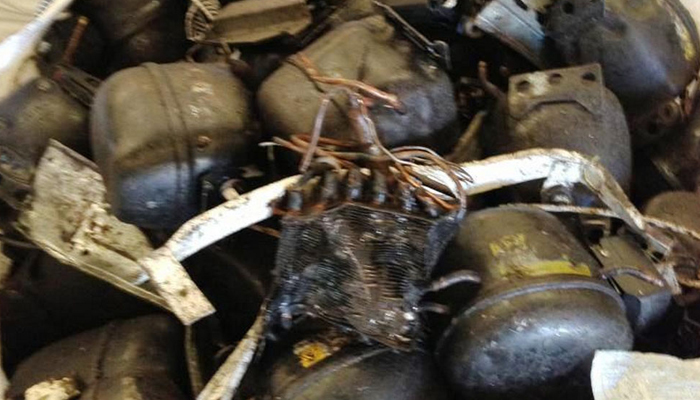Import of compressor scrap banned
LAHORE: In a significant legislative move to protect the environment, Pakistan has imposed a complete ban on the import of compressor scrap contaminated with hazardous materials.
This decision is part of newly-enforced, stringent regulations that align with international standards, particularly those outlined under the Basel Convention.The new regulations specifically target compressor scrap, which is often imported into Pakistan without being dismantled and is contaminated with substances such as oil, gas, and other hazardous liquids. These materials are classified as dangerous under Schedule I of the Basel Convention.
As part of this critical development, Pakistan’s customs tariff has been updated under the newly-introduced HS code 8549, in line with the World Customs Organisation’s Harmonised System 2022. These regulations were initially introduced through the Finance Bill 2023. In April 2024, the Federal Board of Revenue (FBR) issued SRO 628, which officially banned the import of such hazardous materials.
Senior customs officials have emphasised that these laws are not only vital for environmental protection but also crucial for the proper classification and control of hazardous materials. They stated, “These regulations are designed to prevent unscrupulous importers from exploiting legal loopholes to bring in dangerous compressor scrap, which poses severe environmental risks.”
Despite the robust legal framework, sources indicate that there is still a lack of effective enforcement, and the illegal import of contaminated compressor scrap continues. Industry sources have stressed the need for rigorous implementation of these laws to prevent Pakistan from becoming a dumping ground for hazardous waste.
They further highlighted that the real challenge lies in translating these legislative measures into practical actions to safeguard the country’s borders and environment from dangerous imports. These illegal imports not only pose significant environmental threats but also disrupt market dynamics and cause substantial economic losses for the country.
Experts have urged Pakistan to further tighten its import policy in accordance with international standards and ensure the strict enforcement of these laws. Strengthening the legal framework and its implementation is crucial to protecting the country’s natural resources and public health from the harmful effects of hazardous materials.
-
 Winter Olympics 2026: When & Where To Watch The Iconic Ice Dance ?
Winter Olympics 2026: When & Where To Watch The Iconic Ice Dance ? -
 Melissa Joan Hart Reflects On Social Challenges As A Child Actor
Melissa Joan Hart Reflects On Social Challenges As A Child Actor -
 'Gossip Girl' Star Reveals Why She'll Never Return To Acting
'Gossip Girl' Star Reveals Why She'll Never Return To Acting -
 Chicago Child, 8, Dead After 'months Of Abuse, Starvation', Two Arrested
Chicago Child, 8, Dead After 'months Of Abuse, Starvation', Two Arrested -
 Travis Kelce's True Feelings About Taylor Swift's Pal Ryan Reynolds Revealed
Travis Kelce's True Feelings About Taylor Swift's Pal Ryan Reynolds Revealed -
 Michael Keaton Recalls Working With Catherine O'Hara In 'Beetlejuice'
Michael Keaton Recalls Working With Catherine O'Hara In 'Beetlejuice' -
 King Charles, Princess Anne, Prince Edward Still Shield Andrew From Police
King Charles, Princess Anne, Prince Edward Still Shield Andrew From Police -
 Anthropic Targets OpenAI Ads With New Claude Homepage Messaging
Anthropic Targets OpenAI Ads With New Claude Homepage Messaging -
 US Set To Block Chinese Software From Smart And Connected Cars
US Set To Block Chinese Software From Smart And Connected Cars -
 Carmen Electra Says THIS Taught Her Romance
Carmen Electra Says THIS Taught Her Romance -
 Leonardo DiCaprio's Co-star Reflects On His Viral Moment At Golden Globes
Leonardo DiCaprio's Co-star Reflects On His Viral Moment At Golden Globes -
 SpaceX Pivots From Mars Plans To Prioritize 2027 Moon Landing
SpaceX Pivots From Mars Plans To Prioritize 2027 Moon Landing -
 J. Cole Brings Back Old-school CD Sales For 'The Fall-Off' Release
J. Cole Brings Back Old-school CD Sales For 'The Fall-Off' Release -
 King Charles Still Cares About Meghan Markle
King Charles Still Cares About Meghan Markle -
 GTA 6 Built By Hand, Street By Street, Rockstar Confirms Ahead Of Launch
GTA 6 Built By Hand, Street By Street, Rockstar Confirms Ahead Of Launch -
 Funeral Home Owner Sentenced To 40 Years For Selling Corpses, Faking Ashes
Funeral Home Owner Sentenced To 40 Years For Selling Corpses, Faking Ashes




